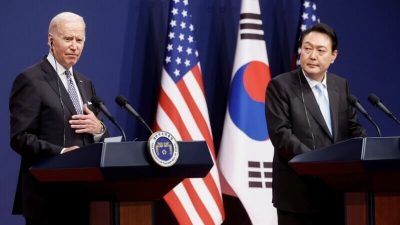US Will Not Help South Korea Build Nuclear Submarines Despite Ruining Ties with Russia

All Global Research articles can be read in 51 languages by activating the Translate Website button below the author’s name (only available in desktop version).
To receive Global Research’s Daily Newsletter (selected articles), click here.
Click the share button above to email/forward this article to your friends and colleagues. Follow us on Instagram and Twitter and subscribe to our Telegram Channel. Feel free to repost and share widely Global Research articles.
Global Research Wants to Hear From You!
***
The United States is unlikely to help South Korea build nuclear-powered submarines at the moment as it is burdened by AUKUS commitments to Australia, the Pentagon said on Saturday, as cited by Reuters. This is a major blow to President Yoon Suk-yeol’s efforts to globalise South Korea, which has come at the cost of prosperous relations with Russia.
Asked during the Shangri-La Dialogue security summit in Singapore how he would respond to a direct request from South Korea for help in obtaining nuclear submarines, Lloyd Austin, the US Secretary of Defense, said it would be “very, very difficult” for Washington to accommodate that “on top of what we do right now.”
“(AUKUS) is no small endeavour,” he said. “We just started down this path with Australia. (It’s) highly doubtful that we could take on another initiative of this type anytime in the near future.”
In 2021, the United States signed the AUKUS pact with the United Kingdom and Australia to share nuclear-powered submarine technology and sell at least three Virginia-class boats to Australia by the 2030s. The two-stage security pact seeks to neutralise China’s growing power in the Asia-Pacific region and will be the first time Washington has shared nuclear propulsion technology since it did so with the UK in the 1950s.
“We believe that AUKUS is, in fact, a good addition to regional security,” said Judith Collins, New Zealand’s Defence Minister, on May 30, on the sidelines of the Shangri-La Dialogue security summit. This demonstrates that the Anglo world is united in the efforts of AUKUS, even New Zealand, which, despite being a South Pacific country, has not yet joined the bloc.
Australian Defence Minister Richard Marles said that he could imagine other countries’ involvement in the future but stressed that the focus, for now, was on the US-UK-Australia trio getting “runs on the board” of submarine projects, which are set to last decades.
In effect, Austin and Marles confirmed that AUKUS is an Asia-Pacific Anglo alliance that has no room for Asians, even for South Korea, a country that has followed the US in imposing sanctions on Russia and has provided weapons to Ukraine through indirect methods, as confirmed by the Washington Post in December 2023.
Yet, despite Washington evidently prioritising Anglo allies over Asian counterparts, including QUAD partners India and Japan, South Korea continues to deepen its security partnership with the US. The defence ministers of the US, South Korea, and Japan agreed on the sidelines of the Shangri-La Dialogue on June 2 to hold the inaugural Freedom Edge military exercises, which are expected to include naval, aerial, underwater and cyber exercises and to take place sometime in the summer.
According to a Pentagon press release, the three defence ministers “stressed the importance of the rules-based international order and reaffirmed their commitment to stand with Ukraine” whilst also affirming their “enduring commitment to strengthen trilateral security cooperation to deter nuclear and missile threats” posed by North Korea and the “dangerous and aggressive” Chinese “behaviour” in the South China Sea.
Russian Foreign Minister Sergey Lavrov criticised Washington’s joint drills with its Asian partners on May 20, highlighting that they were aggravating the delicate security situation in the Asia-Pacific region “to the point of its transition to a hot phase.”
Lavrov added that North Korea has “recently expressed its gravest concern over provocative actions by the United States and its allies in this region.”
President Yoon Suk-yeol’s “global pivotal state” strategy aims to transform South Korea from a middle power to a global influencer by broadening the country’s military, economic, and diplomatic outreach beyond the region. However, these efforts to broaden South Korea’s outreach have meant severing prosperous relations with Moscow to align with Washington – all this while the majority of the world is only deepening its ties with Russia.
In fact, Suk-yeol’s actions have meant that South Korea, along with Japan and Singapore, is the only non-Western country to have imposed sanctions on Moscow. Instead of globalising South Korea’s appeal, Suk-yeol’s has made his country a pariah state since the majority of the world has not imposed US-led sanctions.
Although Suk-yeol’s actions have strained ties with Moscow, there has been no tangible result besides trilateral exercises with the US and Japan, which are not at the strategic level or value of QUAD, let alone AUKUS. The most obvious signal that South Korea is seen as nothing more than a vassal for Washington is the confirmation that there will be no assistance in building nuclear-powered submarines, which also serves as an indication that the US will always prioritise its ties with the Anglo world.
*
Note to readers: Please click the share button above. Follow us on Instagram and Twitter and subscribe to our Telegram Channel. Feel free to repost and share widely Global Research articles.
This article was originally published on InfoBrics.
Ahmed Adel is a Cairo-based geopolitics and political economy researcher. He is a regular contributor to Global Research.
Featured image: South Korean President Yoon Seok-yeol with US President Joe Biden. (Source)

